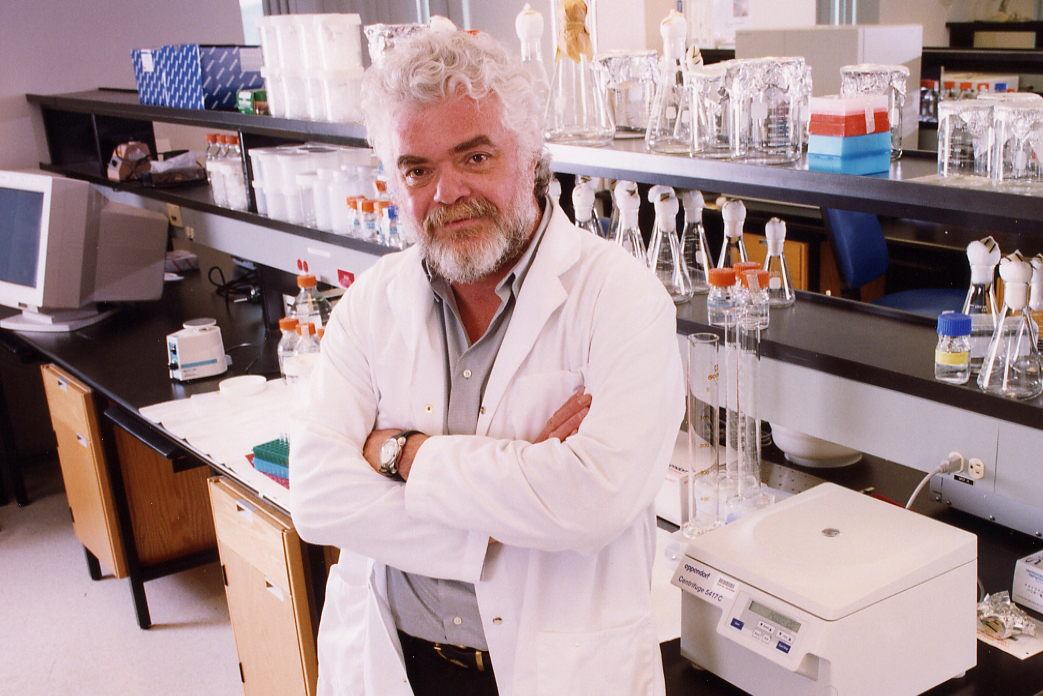
The Royal Society of Canada honours Dr. Frank Plummer for his outstanding contributions to biological science.
Frank Plummer honoured with Flavelle Medal
Dr. Frank Plummer, a trailblazing medical microbiologist who has lead many breakthrough discoveries concerning HIV/AIDS, is being honoured with the Flavelle Medal by the Royal Society of Canada.
This high honour is awarded for outstanding contributions to biological science.
Perhaps the most widely known scientific contribution from Dr. Frank Plummer is how he unraveled the mystery surrounding a particular group of women in Kenya who possessed natural immunity to HIV-1, the virus that leads to AIDS. The research focused on their immune systems and genetics to identify the basis for this resistance, and the project provided vital new information for HIV vaccine and drug development. Global interventions and campaigns have been built on his work, and these currently save tens of thousands of people annually.
“Dr. Plummer has had a tremendous and incalculable impact on global public health and the University of Manitoba is honoured to call Dr. Plummer one of our own,” says Digvir Jayas, vice-president (research and international) and Distinguished Professor of the University of Manitoba. “We congratulate him on this most deserved award that recognizes a lifetime of work that is incomparable to any other’s.”
A graduate of the U of M’s Faculty of Medicine, Dr. Plummer is a University of Manitoba Distinguished Professor of medical microbiology and former Canada Research Chair in Resistance and Susceptibility to Infections. He has served as senior scientific advisor of the Public Health Agency of Canada, director general of the Centre for Infectious Disease Prevention and Control in Ottawa, and as scientific director general of the National Microbiology Laboratory in Winnipeg.

Plummer sits with his friend Jennifer in Kenya, whom he met in his 17 years working in the country. He met her when she was 17 and diagnosed with HIV. Today she has 3 healthy children thanks, in part, to the work of Dr. Plummer // Submitted photo
Dr. Plummer’s Kenya AIDS Control Program (which you can learn more about in this award-winning UM Today The Magazine article) generated much of what we now know about the HIV epidemic in Africa and has had enormous impact on global sexually transmitted infections (STI) health policy. Its syndromic approach to STI management lead to a 25 per cent decrease in STIs in program clinics and up to a 40 per cent decrease in other clinics to which this approach has been disseminated, such as those in Uganda, Cambodia, Thailand and southern India.
Some of the ground-breaking achievements of Dr. Plummer and his research team include: the early identification and confirmation that there is indeed a largely heterosexually transmitted epidemic of HIV in Africa; the important role of the “conventional” STIs in enhancing and facilitating HIV infection; understanding the important role of breastfeeding in the transmission of HIV from mothers to children; the finding that hormonal contraceptive methods can facilitate HIV transmission; the important protective effect of male circumcision for HIV acquisition in men; the identification of highly HIV-exposed Female Sex Workers (FSWs) who are resistant to HIV infection and the subsequent understanding of acquired immunity to HIV; and the importance of focused prevention programs for FSWs and their clients in reducing HIV transmission in both of these groups and in the general community.
Dr. Plummer’s honours are numerous and impressive. In particular, he has been recognized and made an Officer of the Order of Canada, given the Order of Manitoba, and most significantly the McLaughlin Medal of the Royal Society of Canada, the Prix Galien Research Award, and the Killam Prize from the Canada Council for the Arts.
Research at the University of Manitoba is partially supported by funding from the Government of Canada Research Support Fund.







Congratulations, Dr. Plummer! You are world-renowned, distinguished, and a University of Manitoba treasure!